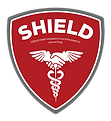The Issue
Law enforcement faces occupational risks, stressors, and burnout from responding to the overdose crisis. There is a gap between new responsibilities placed on officers and the training and resources provided, reducing officer wellness and effectiveness. SHIELD fills the gap by delivering evidence-based training, customized to local needs, featuring easy-to-implement practices such as task-shifting to community-based specialists to boost officer occupational safety, wellness, and effectiveness.
Our Curriculum
The SHIELD Training Initiative trains police officers how to be safe, healthy, and more effective when performing their duties during the overdose crisis. It is a vital resource at a time when police are being asked to do more with less, while facing high risks and reduced public support. Built on two decades of experience working with law enforcement agencies and deep knowledge of the research base, the SHIELD curriculum is practice-driven and solutions-focused. It fills major training gaps, giving officers the tools they need to be safer, healthier, and more effective in these crises.
This program from the SHIELD Training Initiative will provide officers and departments with operational strategies and best practices to use in responding to the overdose crisis in order to:
-
Protect officers from occupational health and safety risks
-
Expand officers' toolbox to help them respond more effectively to the public safety challenges of substance-use related encounters
-
Improve job satisfaction by offering strategies to reduce officer stress and burnout by task-shifting to specialized community resources
-
Reduce addiction and related crime in the community


Module 1:
Responder Resilience
Stress, burnout, and trauma
Resources for responder wellness
Module 1:
Responder Resilience
Key facts on mental strain and tools to reduce burnout and improve wellness during the overdose crisis



Module 2:
Responder Safety
Bloodborne disease
(Hepatitis & HIV)
How to conduct search to avoid NSI
(skills presentation)
Fentanyl concerns
Module 2:
Responder Safety
Key facts on physical risks and strategies to improve occupational safety during the overdose crisis



Module 3:
Public Safety
Operational strategies to reduce stress load and free up resources
Best practices for improving
public safety outcomes through
task shifting
Module 3:
Public Safety
Operational strategies that enhance field impact and improve community relations – while also reducing stress and risks during the overdose crisis

Impact
The SHIELD training is based on nearly two decades of experience and research on the roles of law enforcement's response to public health challenges.
The SHIELD training model’s core curriculum has been extensively evaluated. It has been found to be effective in boosting officer attitudes and intentions about using best practices that deliver multiple benefits:
-
Improving public safety by reducing addiction and drug-related crime in the community
-
Increasing officer wellbeing and retention by reducing stress, improving police morale, occupational safety, and job satisfaction, while also facilitating community level collaboration
.png)